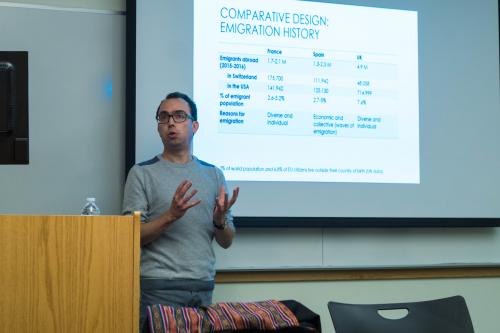
Visiting Fellow in European Studies, Tudi Kernalegenn spoke about his postdoctoral research concerning the political choices of emigrants at a lecture on October 25, 2018.
Dr. Kernalegenn’s work focuses on the engagement of emigrants in their home-country politics. His presentation synthesized the results of a fieldwork study comparing three expatriate populations, French, Spanish and British, in two receiving countries, Switzerland and the United States. According to Dr. Kernalegenn, the main goal of the research, which is ongoing, is to assess the extent to which British, French and Spanish parties are active and organized among emigrants based on two main variables: the different political rights afforded to British, French and Spanish emigrants abroad, and the socio-historical structure of respective emigrant parties.
At Yale, Dr. Kernalegenn is carrying out his American fieldwork, which includes observing meetings and events and conducting interviews with activists. He has completed his fieldwork in Switzerland.
During his talk, Dr. Kernalegenn outlined four forms of political parties abroad: anti- colonialist political organizations, liberation or opposition movements, forbidden separatist movements, and political parties supporting or participating peacefully in home politics. His research focuses on the fourth form i.e. mainstream parties abroad that can be linked to the extension of the democratic sphere of established nation-states. To settle his study, Dr. Kernalegenn explained, he used the typology of Political Scientist Richard Katz, which establishes coordination, contesting elections, recruitment and selection, and representation as the four main functions of political parties at home. In his research, Dr. Kernalegenn seeks to answer whether political parties abroad accomplish the same functions wherever they are and whichever countries they are linked to.
The research has thus far led to a mixed bag of results. According to Dr. Kernalegenn, his first hypothesis, that the more developed the political rights of emigrants are, the stronger and more organized political parties abroad will be, has been verified, proving that “the importance of the political rights of emigrants is the most important variable to explain the strength and organization of political parties abroad.”
The second hypothesis, however, stating that the more important the diaspora, the stronger and more organized political parties abroad will be, has only been partially verified. At the local level, Dr. Kernalegenn explain, the number and density of emigrants explain “to a large degree” the presence of local groups, but not at a global level. For instance, he added, British parties abroad are very weak compared to French parties despite the fact that British emigrants are far more numerous.
Similarly, Dr. Kernalegenn said his third hypothesis, that political parties abroad are more present online than in real life, has also been partially verified. Political parties abroad are indeed very present online, he said, but a truer test of their reality and influence is their ability to be active on the field with their meetings, organizations and actions. Meanwhile, the fourth hypothesis, the functions of political parties abroad are different from those at home, has been partially contradicted, according to Dr. Kernalegenn, who explained that the functions of French parties abroad are actually very similar to those at home.
Dr. Kernalegenn received his Ph.D. from the Institut d’Études Politiques de Rennes (France), with a dissertation on “A Cognitive Approach to Regionalism. Regional identities, territories, social movements in Brittany, Scotland and Galicia in the 1970s”.
Written by Zainab Hamid, Timothy Dwight College, Class of 2019

